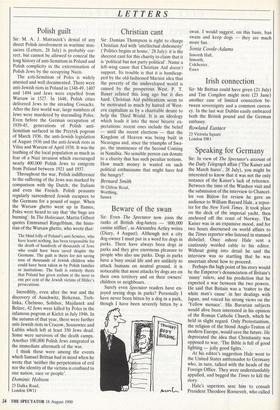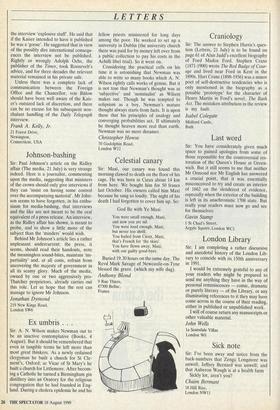Speaking for Germany
Sir: In view of The Spectator's account of the Daily Telegraph affair (`The Kaiser and the March hares', 28 July), you might be interested to know that it was not the only instance of the Kaiser's lack of reticence. Between the time of the Windsor visit and the submission of the interview to Chancel- lor von Billow for review he gave an audience to William Bayard Hale, a repor- ter for the New York Times. It took place on the deck of the imperial yacht, then anchored off the coast of Norway. The Kaiser was in an expansive mood, and for two hours discoursed on world affairs to the Times reporter who listened in stunned disbelief. Once ashore Hale sent a cautiously worded cable to his editor. Without going into detail he said the interview was so startling that he was uncertain about how to proceed.
Perhaps the high point of his story would be the Emperor's denunciation of Britain's 'ninny' rulers, and his prediction that he expected a war between the two powers. He said that Britain was a 'traitor to the white man's cause' in her dealings with Japan, and voiced his strong views on the 'Yellow menace'. His Bavarian subjects would ahve been interested in his opinion of the Roman Catholic Church, which he held in slight regard. Only Protestantism, the religion of the blond Anglo-Teuton of modern Europe, would save the future. He deprecated the idea that Christianity was opposed to war. 'The Bible is full of good fighting — jolly good fights.'
At his editor's suggestion Hale went to the United States ambassador to Germany who, in turn, talked with the heads of the Foreign Office. They were understandably appalled, and begged the Times to kill the story.
Hale's superiors sent him to consult President Theodore Roosevelt, who called
LETTERS
the interview 'explosive stuff'. He said that if the Kaiser intended to have it published he was a 'goose'. He suggested that in view of the possibly dire international consequ- ences the interview not be published. Rightly or wrongly Adolph Ochs, the publisher of the Times, took Roosevelt's advice, and for three decades the relevant material remained in his private safe.
Unless there was a complete lack of communication between the Foreign Office and the Chancellor, von Billow should have been well aware of the Kais- er's outsized lack of discretion, and there can be no excuse for his subsequent non- chalant handling of the Daily Telegraph interview.
Frank A. Kelly, Jr.
21 Forest Drive, Newington, Connecticut, USA



























































 Previous page
Previous page